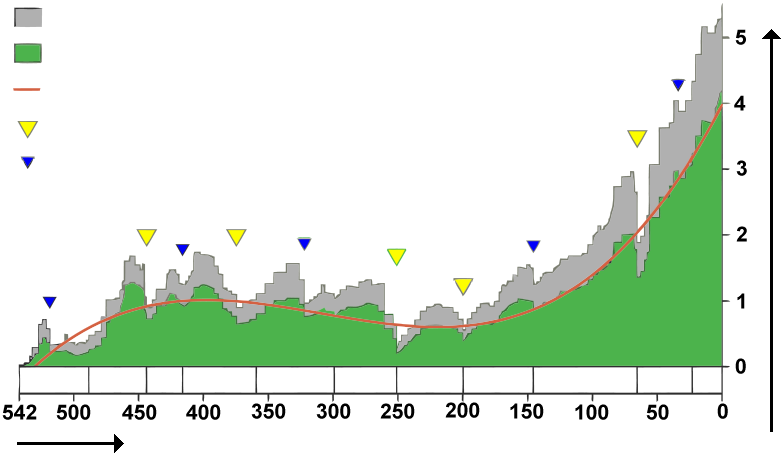Page 1 of 1
Wow; getting dizzy!
Posted: Fri Apr 10, 2020 1:41 am
by orin stepanek
https://www.sciencefocus.com/space/how- ... he-galaxy/
No wonder! Just found out we are going about 800,000 km/hr. as Sol drags us around the galaxy!

Not to mention other motion factors! Got me to wondering though how do you think that might play a part of the weather as we travel through different sides of the orbit! Do we go through cold areas or hot areas? does that create other problems? Ahh I don't have a clue!

Re: Wow; getting dizzy!
Posted: Fri Apr 10, 2020 2:14 am
by Ann
I read someplace, a while ago, that the Solar system is about to enter into an interstellar dust cloud. How will that affect us?
Probably not much, since the gas cloud is sure to be extremely tenuous. Maybe, maybe, maybe it will make it a little harder for man-made telescopes to peer into the Universe.
Ann
Re: Wow; getting dizzy!
Posted: Fri Apr 10, 2020 2:30 am
by neufer
orin stepanek wrote: ↑Fri Apr 10, 2020 1:41 am
https://www.sciencefocus.com/space/how- ... he-galaxy/
No wonder! Just found out we are going about 800,000 km/hr. as Sol drags us around the galaxy!

Not to mention other motion factors! Got me to wondering though how do you think that might play a part of the weather as we travel through different sides of the orbit! Do we go through cold areas or hot areas? does that create other problems? Ahh I don't have a clue!

https://en.wikipedia.org/wiki/Extinction_event#Patterns_in_frequency wrote:
<<It has been suggested variously that extinction events occurred periodically, every 26 to 30 million years, or that
diversity fluctuates episodically every ~62 million years. Various ideas attempt to explain the supposed pattern, including the presence of a hypothetical companion star to the sun,
oscillations in the galactic plane, or passage through the Milky Way's spiral arms. However, other authors have concluded that the data on marine mass extinctions do not fit with the idea that mass extinctions are periodic, or that ecosystems gradually build up to a point at which a mass extinction is inevitable. Many of the proposed correlations have been argued to be spurious. Others have argued that there is strong evidence supporting periodicity in a variety of records, and additional evidence in the form of coincident periodic variation in nonbiological geochemical variables.>>
Re: Wow; getting dizzy!
Posted: Fri Apr 10, 2020 11:02 am
by orin stepanek
Ann wrote: ↑Fri Apr 10, 2020 2:14 am
I read someplace, a while ago, that the Solar system is about to enter into an interstellar dust cloud. How will that affect us?
Probably not much, since the gas cloud is sure to be extremely tenuous. Maybe, maybe, maybe it will make it a little harder for man-made telescopes to peer into the Universe.
Ann
Me thinks that Sol's hypersphere would keep the dust away from the Solar System

! But I must confess that I'm speculating!

Re: Wow; getting dizzy!
Posted: Fri Apr 10, 2020 11:03 am
by orin stepanek
neufer wrote: ↑Fri Apr 10, 2020 2:30 am
orin stepanek wrote: ↑Fri Apr 10, 2020 1:41 am
https://www.sciencefocus.com/space/how- ... he-galaxy/
No wonder! Just found out we are going about 800,000 km/hr. as Sol drags us around the galaxy!

Not to mention other motion factors! Got me to wondering though how do you think that might play a part of the weather as we travel through different sides of the orbit! Do we go through cold areas or hot areas? does that create other problems? Ahh I don't have a clue!

https://en.wikipedia.org/wiki/Extinction_event#Patterns_in_frequency wrote:
<<It has been suggested variously that extinction events occurred periodically, every 26 to 30 million years, or that
diversity fluctuates episodically every ~62 million years. Various ideas attempt to explain the supposed pattern, including the presence of a hypothetical companion star to the sun,
oscillations in the galactic plane, or passage through the Milky Way's spiral arms. However, other authors have concluded that the data on marine mass extinctions do not fit with the idea that mass extinctions are periodic, or that ecosystems gradually build up to a point at which a mass extinction is inevitable. Many of the proposed correlations have been argued to be spurious. Others have argued that there is strong evidence supporting periodicity in a variety of records, and additional evidence in the form of coincident periodic variation in nonbiological geochemical variables.>>
Thanks Art!

 Not to mention other motion factors! Got me to wondering though how do you think that might play a part of the weather as we travel through different sides of the orbit! Do we go through cold areas or hot areas? does that create other problems? Ahh I don't have a clue!
Not to mention other motion factors! Got me to wondering though how do you think that might play a part of the weather as we travel through different sides of the orbit! Do we go through cold areas or hot areas? does that create other problems? Ahh I don't have a clue! 
